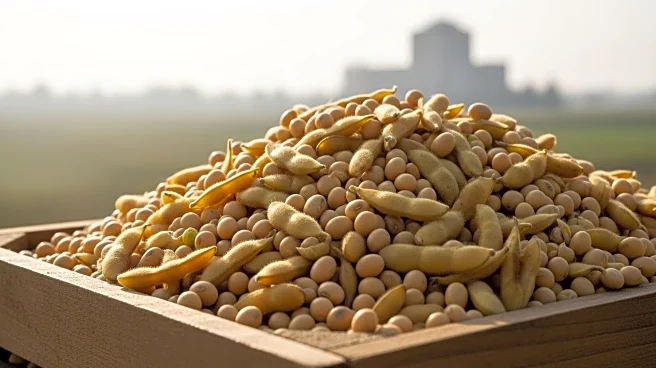What's Happening?
U.S. Treasury Secretary Scott Bessent announced that the federal government will provide support to American soybean farmers due to China's ongoing refusal to purchase U.S. soybeans. This decision comes amidst a trade war between Washington and Beijing, which has resulted in significant financial losses for U.S. farmers. Bessent emphasized the government's commitment to backing farmers, who largely supported President Trump in the 2024 election. The lack of Chinese purchases from the autumn harvest has been a major issue, with Bessent describing the situation as using American farmers as 'hostages' in trade negotiations. President Trump plans to discuss soybeans in an upcoming meeting with Chinese President Xi Jinping, aiming to address the trade impasse.
Why It's Important?
The support for soybean farmers is crucial as they face billions of dollars in lost sales due to the trade conflict with China. This situation highlights the vulnerability of U.S. agriculture to international trade disputes, particularly with major buyers like China. The government's intervention aims to stabilize the agricultural sector and provide relief to farmers affected by the trade war. Additionally, the announcement underscores the strategic importance of agriculture in U.S. trade negotiations, with potential implications for future trade deals. The meeting between President Trump and President Xi could pave the way for resolving trade tensions and restoring market access for U.S. agricultural products.
What's Next?
An announcement detailing the support measures for farmers is expected on Tuesday, which may include financial assistance and collaboration with the Farm Credit Bureau to ensure farmers have necessary resources for future planning. The upcoming meeting between President Trump and President Xi Jinping is anticipated to set a framework for future trade relations, potentially leading to a breakthrough in negotiations. The outcome of these discussions could significantly impact U.S.-China trade dynamics and the agricultural sector's recovery.
Beyond the Headlines
The trade conflict with China has broader implications for U.S. agriculture, highlighting the need for diversification of export markets to reduce dependency on single buyers. The situation also raises ethical concerns about the use of farmers as leverage in international negotiations. Long-term shifts in trade policy could emerge from these developments, influencing global agricultural trade patterns and U.S. economic strategy.









